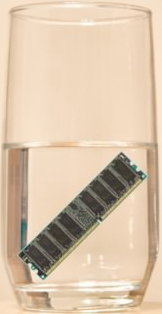
Over the past couple of weeks, Ars has started receiving e-mails about a topic that doesn't really fit into our normal areas of coverage: homeopathy. The belief that the administration of nothing more than water can have a medicinal affect certainly isn't technology, and it only peripherally touches upon science, in the sense that any health benefits it provides seem to involve the placebo affect.
Nevertheless, many of the practitioners of homeopathy have tried to claim the mantle of science, creating scientific-sounding explanations for "water memory"—the idea that a substance can actually gain potency as it is diluted out of existence. These practitioners even formed a peer-reviewed journal to discuss their findings. Six years ago, the journal Homeopathy ran a special issue on these explanations, and the Ars writers teamed up to tackle the bizarre distortions of science that it contained.
So in honor of World Homeopathy Week (which we just received a press release for), we're going to run an updated version of that story. Not because we think there's a value in talking about homeopathy. Rather, by scientifically evaluating homeopathy's attempts to sound scientific and revealing it to be nothing more than "pseudoscience," we think it's possible to learn something about the scientific process and the reasoning that drives it. In turn, we can possibly learn to recognize other areas where scientific reasoning has ended up on the rocks.
This feature was originally published on September 11, 2007.
Welcome to Waterworld
Welcome to a special edition of Nobel Intent. Beyond keeping you familiar with the comings and goings of modern science, we have consistently expressed concern regarding science education and the public understanding of science. Key to that understanding are the basic features of science, such as how scientific concepts are formulated and tested and why they typically produce a better understanding of the natural world than alternative approaches.
But science can be a tricky thing to define, and it's sometimes easier to contrast it with some of the arguments that pose as science. Unfortunately, most of those issues are entangled with implications that keep the basic question—is this science?—obscured by emotional responses. Thus, the science of climatology has become entwined with political, economic, and policy issues. The science of evolution conflicts with the political and religious goals of some individuals. Even basic scientific questions about the nervous system get embroiled in family and personal health issues when topics like autism and radio frequency radiation are broached.
That's why a special edition of the journal Homeopathy appears to be a gift, allowing us to look at science and psuedoscience without getting entangled with politics and religion. Homeopathy claims to be a form of medical practice that's based on the principle that "like cures like." Given a set of symptoms, a homeopath will identify an herb or chemical that causes similar symptoms. Following a predefined ritual, the homeopath performs a series of dilutions of that chemical that continue well beyond the point where there should be no molecules of it left—the final solution is essentially well-shaken water.
Giving patients water is probably a lot less harmful than many folk remedies that fly under the scientific radar, but homeopathy has two notable distinctions. One is that people spend a lot of money on it—the US market was already close to half a billion dollars in 1999. The second is that homeopaths have demanded that their field be treated as a science, performing clinical studies, proposing mechanisms, and even convincing Elsevier to publish Homeopathy, a peer-reviewed journal.
The articles in this special edition of Homeopathy display a number of consistent themes: internal inconsistency; a rejection of scientific standards and methods; and established science is applied to inappropriate situations (for example, quantum entanglement between people is proposed). In cases where mechanisms are suggested, they frequently violate our basic understanding of the natural world. Tying things together are unsupported assertions and logical leaps that have no place in science. The experience of reading the journal was like seeing a science publication reflected through Alice's looking glass.
By criticizing homeopathy, we hope to illuminate the general distinctions between science and pseudoscience. Hopefully, in finding a topic that's largely free of baggage, we'll help provide a broader picture of what makes science distinct from fields that feign scientific legitimacy.
Suppression of water memory
Most special editions start with an editor's comment; this is no exception. Homeopathy’s editor acknowledges that the most widely held theory for homeopathic action involves the placebo effect. However, he also claims that there is a growing body of evidence for the efficacy of homeopathy, so water memory should be further investigated. He makes a bold claim regarding what the results will be: "There is much work to be done, but at this stage we can say one thing with certainty: the assertion that homeopathy is impossible because the 'memory of water' is impossible is wrong."

The memory of water
Does the rest of this issue bear out this statement? The second article, entitled "The memory of water: an overview,” acts as an introduction. The implication of this title is that we should be able to get a good feel for the state of the field, where it is heading, and what challenges remain.
The author, Martin F. Chaplin, writes with the assumption that the existence of water memory is obvious. But Chaplin never gives a definition of the "water memory effect." As one reads the article, it becomes clear that any behavior of water that is non-obvious is "water memory." This allows Chaplin to present a mix of trivia as if it formed a coherent body of scientific evidence. Oddly, whenever any of these behaviors must be described, Chaplin presents an analogy. We have never seen analogy used in scientific writing as a replacement for a direct, formal argument.
The role of water memory in homeopathy could be demonstrated in two ways: physical measurement of some structure that was imposed upon water by the active ingredient or by the demonstrated efficacy of the diluted solution. Chaplin would, apparently, disagree:
"Editorial comment in the scientific press has subsequently drawn on whether water can indeed show any 'memory' of its prior history as direct 'proof' of whether homeopathy can be successful or not. Such linkage is quite unnecessary and may easily mislead as the two areas utilize fundamentally differing and entirely independent evidence and should therefore be considered separately."
In a certain sense this is true; consistent observations for the efficacy of homeopathy can and would stand alone. However, no such body of evidence appears in this issue, which shifts the burden to evidence for the memory of water. Water memory claims violate several deeply held physical principles that are backed by a great deal of evidence, so proof of the failure of these principles should require solid data. Instead, we are subjected to increasingly wild and far-fetched proposals that, in the absence of direct evidence, must be investigated as a substitute. Chaplin bristles at the fact that these proposals have not been well received by the scientific community, and he suggests that science’s high standards for overturning established principles have "resulted in the slow uptake of new ideas and the overly long retention of fallacious concepts."
Let's consider science's track record in this regard. Quantum mechanics, special, and general relativity spring to mind as examples of radical new ideas. They went from new hypotheses to accepted theories in less than the working lifetime of the scientists involved. RNA splicing and interference were radical at the time yet were quickly accepted on the basis of solid evidence. This should tell you something about both science and this author.
reader comments
388